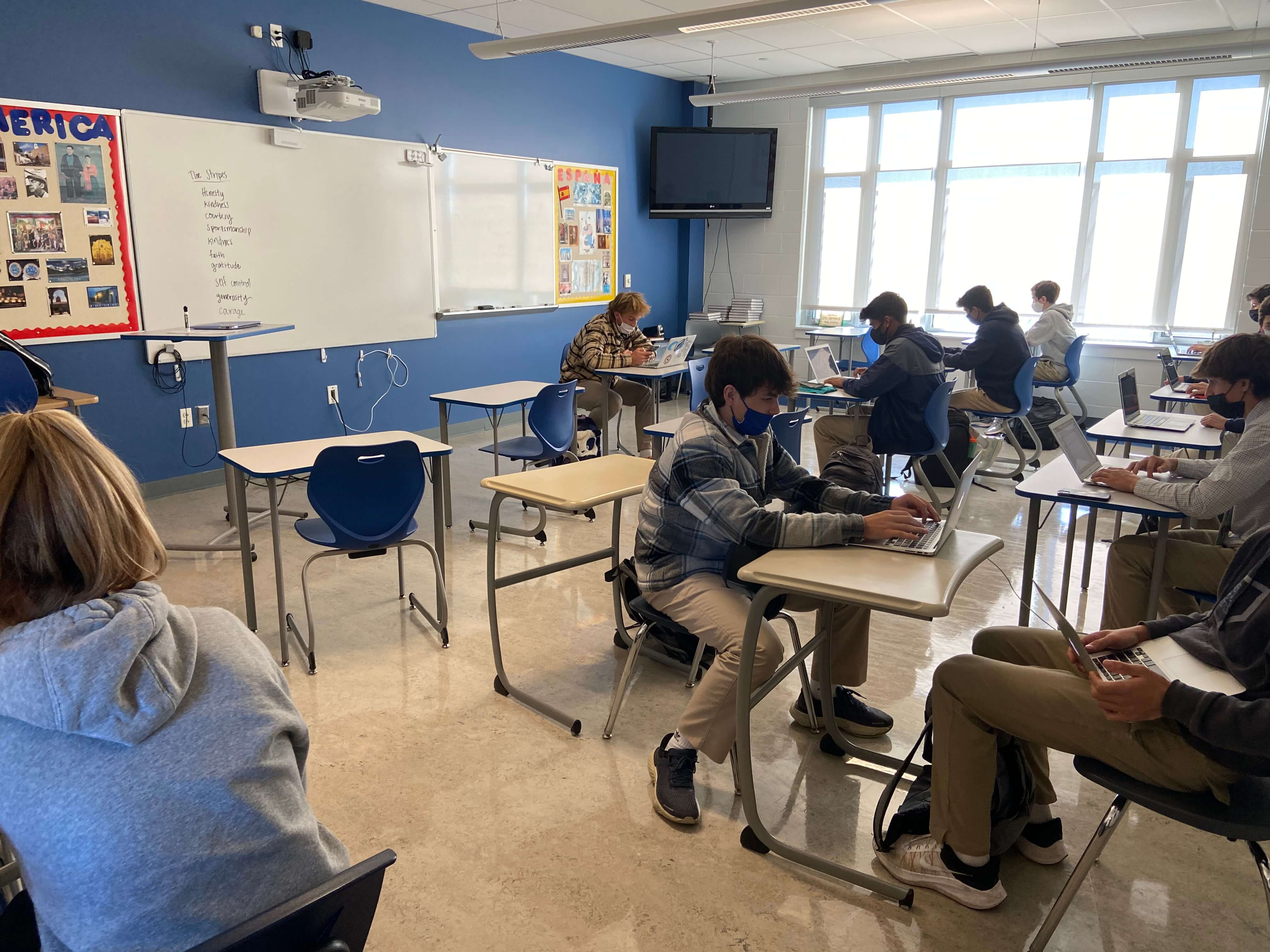Emiola Enakhimion ‘24
With the recent addition of classes and programming like Computer Science, Biblical Literature, and Seminar, graduation requirements consume an excessive amount of time in student schedules. Furthermore, these standard-level courses prevent students from pursuing more honors and AP classes.
Up until 2019, an EA diploma required three years of math and history, two years of a language, and four years of English. One year of biology, chemistry, and physics was also mandatory. In addition to core classes, students must have completed at least one religion credit and one art credit in different disciplines.

Photo Courtesy of Ashley Tang ’22
Within the past two years, two significant changes have been made to the Upper School graduation requirement. With the exception of the senior class, all Upper School students must earn one half-credit of Computer Science. Additionally, Biblical Literature has been added as a required course starting with this year’s incoming freshman. For the Class of 2025, it is already difficult adjusting to increased coursework and different school dynamics. On top of navigating this transition, the freshmen have to learn changing requirements and formulate a long-term plan to fit new requirements in their schedule along with classes of their choice. This can be overwhelming, especially since freshmen can no longer easily turn to older siblings, teammates, and friends for scheduling and class advice.
The addition of Biblical Literature as a required course restricts students’ freedom to pursue a religion course of their interest. While many students would have taken this course regardless of its compulsory nature, this adjustment deters some students from taking multiple advanced religion courses they were excited for. Now, a student that desired to fulfill their religion requirements with Genocide and Ethics may feel pressured to only take one of these courses in addition to Biblical Literature.
Moreover, the necessity of completing a half-credit of Computer Science further overloads student schedules. Though this may not seem like much of a change, the impact of these decisions is great. First of all, these required classes take up time in the student schedule which might have been spent on classes the student is passionate about. Furthermore, with a maximum of seven courses allowed at once, Computer Science may force a student to take another semester elective the other half of the year instead of enrolling in one exciting year-long course.
Study halls to complete work during the school day are also being taken away by new requirements. EA has implemented both 9th and 10th-grade seminars, which meet for one or two study halls per cycle, respectively. These requirements are increasing the already challenging workload for students and providing them less time to do it. EA likes to tell prospective and current students and parents that Upper Schoolers have plenty of time during the school day to get a decent portion of their work done before going home. However, this is simply no longer the case. When asked about the number of required classes, Velina Feuzeu ‘24 stated, “Students are unable to take the classes they desire or they have to prolong classes that they don’t want to take because they are required at EA. As some students find what they want to pursue in life, these required classes sometimes get in the way.” The amount of graduation requirements is stifling for the freshmen, sophomore, and junior classes, who are struggling to find time to take all the courses they want while fulfilling the requirements. Students realistically only have 6-7 blocks and four years to fit in both required courses and classes of genuine interest. Most students have to take summer classes or sacrifice certain classes due to these requirements.
Despite the negative opinions of some students, Head of Upper School Mr. Letts stands by the addition of these graduation requirements, stating, “In terms of the new requirement of Biblical Literature, during conversations with Chaplain Gavin, we feel like as a Christian school it is important for all students to have some familiarity with the Bible. Core competency with the Bible is required. Sort of similarly, basic skills in computer science are critical to real life and to be fully prepared for college.” However, Letts also acknowledges the added pressures placed on students, saying, “I also worry that these requirements will burden the students and I realize that we ask a lot of students. We constantly think about these things and solutions such as summer programs, and beginning to look at the curriculum across the board.” Preparing students for college and making sure they have adequate skills in life is an ever-changing job, and school administrators must constantly change these curriculums.
Though the coursework at EA is designed to challenge students and prepare them for their future, the most recent curriculum changes take a significant toll on students and their respective class schedules. In order to help students’ workloads, EA should make sure to provide additional free time, reconsider new requirements, cease additional requirements, and widen the variety of summer courses available.